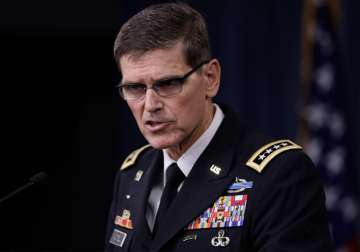Top commander signals larger, longer US presence in Syria
Gen. Joseph Votel, head of U.S. Central Command, said that he will need more conventional forces to insure stability once the fight to defeat ISIS in their self-declared capital of Raqqa is over.

The top US commander in the Middle East signalled Thursday that there will be a larger and longer American military presence in Syria to accelerate the fight against the Islamic State group and quell friction within the complicated mix of warring factions there.
Gen. Joseph Votel, head of U.S. Central Command, told senators Thursday that he will need more conventional U.S. forces to insure stability once the fight to defeat Islamic State militants in their self-declared capital of Raqqa is over. The U.S. military, he said, can't just leave once the fight is over because the Syrians will need help keeping IS out and ensuring the peaceful transition to local control.
Votel's testimony to the Senate Armed Services Committee comes as up to 400 U.S. forces have moved into Syria in recent days. Well more than half of those are Marines, bringing in large artillery guns for the Raqqa fight, and the rest are Army Rangers who went into northern Syria to tamp down skirmishes between Turkish and Syrian forces near the border. The numbers have been fluctuating, often on a daily basis, as troops move in and out.
"I think as we move towards the latter part of these operations into more of the stability and other aspects of the operations, we will see more conventional forces requirements," Votel said. Until recently, the U.S. military presence in Syria was made up of special operations forces advising and assisting the U.S.-backed Syrian troops.
It will be critical, Votel said, to get humanitarian aid, basic working services and good local leaders in place in Raqqa so that businesses can return and the city can move on.
He also told senators that the U.S. is looking for options to ease the tensions with Turkey over the plan to use U.S.-backed Syrian Kurds in the fight to oust Islamic State fighters from Raqqa. But he offered no details on what those options could be.
The U.S. is considering arming the Syrian Kurdish forces, which the Pentagon considers the most effective fighters against IS militants in northern and eastern Syria. But Turkey, a key NATO ally, considers the Syrian force, known as the YPG, a terrorist organization. Turkey wants to work with other Syrian opposition fighters known as the Free Syrian Army to liberate Raqqa.
Pentagon leaders sent a new plan to defeat IS to the White House late last month that included a variety of options for the ongoing fight in Iraq and Syria. The White House hasn't yet approved the plans, but the recent deployments into Syria suggest that President Donald Trump may be leaning toward giving the Pentagon greater flexibility to make routine combat decisions in the IS fight.
Military commanders frustrated by what they considered micromanagement under the previous administration have argued for greater freedom to make daily decisions on how best to fight the enemy
In separate comments, Votel also reaffirmed that more American forces are needed in Afghanistan, a point the top U.S. commander in that country made to Congress several weeks ago. Votel agreed that the fight against the Taliban is in a stalemate, and said "it will involve additional forces" to ensure the U.S. can better advise and assist the Afghan forces.
U.S. Gen. John Nicholson, the top American commander in Afghanistan, told the Senate Armed Services Committee last month that he needs a few thousand more troops to help end the stalemate there. And Defense Secretary Jim Mattis said in recent weeks that he will make decisions soon on whether to recommend an increase in the U.S. force.